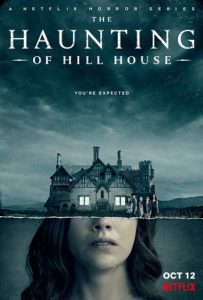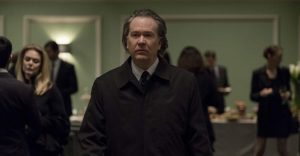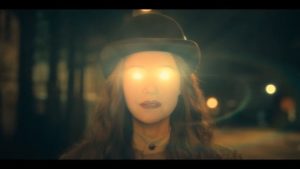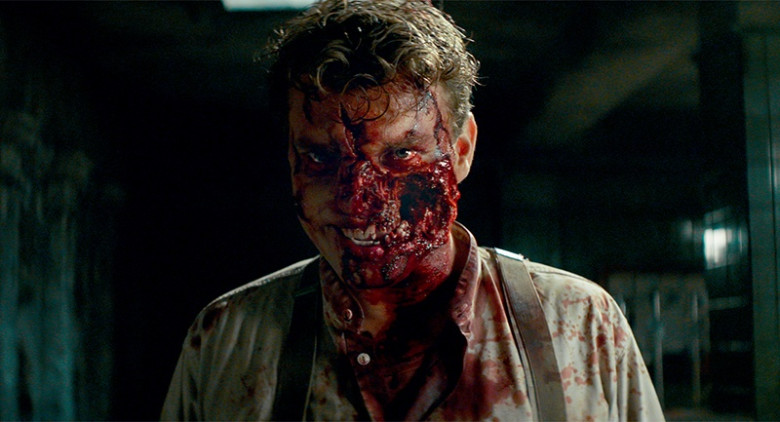 I was almost too scared to look. Much like Shirley Crain was afraid to look into the open casket at her mother’s funeral. Many legends and whispers of good tidings broached my ears, telling tale of a critically-acclaimed horror show. But, I scare easily; I didn’t want to be unable to sleep after watching it. A friend volunteered to start it with me and within three days I’d watched the whole thing. Was the show scary? Yes. Do I recommend it? Yes.
I was almost too scared to look. Much like Shirley Crain was afraid to look into the open casket at her mother’s funeral. Many legends and whispers of good tidings broached my ears, telling tale of a critically-acclaimed horror show. But, I scare easily; I didn’t want to be unable to sleep after watching it. A friend volunteered to start it with me and within three days I’d watched the whole thing. Was the show scary? Yes. Do I recommend it? Yes.
The Haunting of Hill House concerns the Crain family, five siblings, Steven, Shirley, Theo, Luke and Nell. As children, they family lived in Hill House, purported to be the most haunted home in America. Predictably, almost everyone is terrorized by phantoms and other spooky specters. You can read this as a flat out confront-the-ghost story, but you’d be doing yourself a disservice. I believe the tale presented to us is one of a deep and pervasive wound that the Crains have not been able to properly heal: the death of their mother. This is the series true ghost.
We learn quickly that upon the Crain family’s final night in Hill House Olivia, the Crain matriarch committed suicide. None of the children bear witness to this event and their father, Hugh, refuses to explain how or why, thinking that he can protect his children from the horrors within Hill House. Understandably, this leads to estranged relationships amongst the children and especially with their father.
 As many online have argued, each of the five Crain Siblings can be understood to represent a different stage of grief. Eldest brother Steven spends his days writing books about ghosts, but doesn’t believe in them. Oldest sister Shirley runs a funeral home angry at Steven, her father and the rest of the world for slights against her. Middle child Theodora pushes everyone away distracting herself with work and sex (Bargaining). A depressed Luke wrestles with heroin addiction and the resulting distrust from his family. And Nell struggles with accepting that her family has almost broken apart. Only Nell seems to realize that these relational fractures are the result of suffering in isolation.
As many online have argued, each of the five Crain Siblings can be understood to represent a different stage of grief. Eldest brother Steven spends his days writing books about ghosts, but doesn’t believe in them. Oldest sister Shirley runs a funeral home angry at Steven, her father and the rest of the world for slights against her. Middle child Theodora pushes everyone away distracting herself with work and sex (Bargaining). A depressed Luke wrestles with heroin addiction and the resulting distrust from his family. And Nell struggles with accepting that her family has almost broken apart. Only Nell seems to realize that these relational fractures are the result of suffering in isolation.
But, after the death of another family member in episode 1, all our character’s ghosts (literal and figurative) return to haunt them. The series revolves around a funeral. We witness each character mourn. I came to mourn as well, genuinely experiencing the loss of a character whom I’d quickly come to like. We are given a chance to meditate on the grief the Crains feel. Their grief threatens to consume them, much like Hill House.
Hugh Crain, the father, articulates and refutes a powerful theodicy, a flawed defense against evil, towards the show’s end: “I was holding a door… I had my back against it, my arms out wide, because I knew there were monsters on the other side and they wanted what was left of our family. And, I held it so hard I didn’t have arms left for the kids. And the monsters came through anyway.” Hugh’s goal is to fix things, to protect his family. But he comes to realize that he cannot keep suffering from them, he has to help them through it.
 Despite an excellent lead-up, the show’s ending is… problematic. I appreciate the message, less so the execution, it’s a little too sweet for a ghost story. It admittedly undoes some of the well-crafted scares; through a bafflingly strange sub-plot that goes against what I think is the message of the show. But the lesson rings true: evil, grief and pain cannot be escaped. We will all grieve alone, but we don’t have to and lamenting together is how we can resist evil.
Despite an excellent lead-up, the show’s ending is… problematic. I appreciate the message, less so the execution, it’s a little too sweet for a ghost story. It admittedly undoes some of the well-crafted scares; through a bafflingly strange sub-plot that goes against what I think is the message of the show. But the lesson rings true: evil, grief and pain cannot be escaped. We will all grieve alone, but we don’t have to and lamenting together is how we can resist evil.
Review| The Haunting of Hill House: A Grief Unobserved
by tbarker1
Previous articleReview| Overlord Next article Maybe Redemption Has Stories to Tell: Warrior (2011) & Good Will Hunting (1997)
Next article Maybe Redemption Has Stories to Tell: Warrior (2011) & Good Will Hunting (1997)
 Next article Maybe Redemption Has Stories to Tell: Warrior (2011) & Good Will Hunting (1997)
Next article Maybe Redemption Has Stories to Tell: Warrior (2011) & Good Will Hunting (1997)
